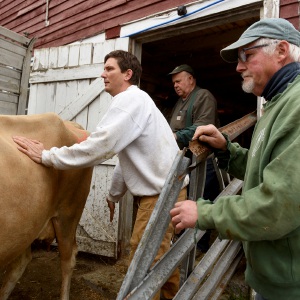Proposed short-term rental cap, new fee structure inspires debate in Woodstock
| Published: 03-28-2024 4:45 PM |
WOODSTOCK — Short-term rental owners and town officials are at odds over how to regulate the market in Woodstock.
On Wednesday, the town Planning Commission — during a joint meeting of the Woodstock Selectboard and Village Trustees on Wednesday — proposed a new municipal ordinance that includes a cap on the number of short-term rentals that are allowed to operate at any given time.
It has been about four years since the current policy was updated, and the Planning Commission has been considering a new ordinance since last February. The Selectboard and Village Trustees are expected to vote on it in late April.
“There are major gaps in both regulations and their enforceability,” Planning Commission Chairman Ben Pauly said.
The proposed ordinance — which defines short-term rentals as a house, condo or part of a home that is rented out for fewer than 30 days but more than 14 days to travelers — has five stated purposes, including public safety and preserving “Woodstock’s sense of place.”
Two of the purposes refer to Woodstock’s need for long-term housing, with the last purpose stating it “incentivizes the conversion of short-term housing to long-term housing.” The Planning Commission did not provide details during the meeting on how that would happen.
While Pauly said that short-term rentals alone were not to blame for the housing shortage, they do play a role.
“We’re trying to find a balance,” Pauly said.
Article continues after...
Yesterday's Most Read Articles
 Herd departs Hartford’s last remaining dairy farm
Herd departs Hartford’s last remaining dairy farm
 At Dartmouth, hundreds protest ongoing war in Gaza and express support for academic freedom
At Dartmouth, hundreds protest ongoing war in Gaza and express support for academic freedom
 Claremont removes former police officer accused of threats from city committees
Claremont removes former police officer accused of threats from city committees
 Over Easy: ‘A breakfast without a newspaper is a horse without a saddle’
Over Easy: ‘A breakfast without a newspaper is a horse without a saddle’
The proposal faces opposition from short-term rental owners who voiced their concerns during a Planning Commission meeting Monday and at Wednesday’s Selectboard and Village Trustees meeting.
Among their concerns were that the proposed fees were too high and that having short-term rentals allows them to pay the ever-increasing property taxes. Many also said that their short-term rentals are not suitable for long-term stays.
“I think the fees proposed by the Planning Commission are excessive and out of reach of most small STR owners,” said Todd Wheeler, who owns a short-term rental in Woodstock Village. “We won’t be able to recoup the cost of those fees.”
Currently, the town and the village have separate ways of regulating short-term rentals through zoning bylaws. The town has had a permit requirement since 2002, while the village has had one since 2005.
The regulations require rental operators to pay a one-time fee — with an average cost of $1,045 — to get a permit from the Planning and Zoning Department, and cap the number of days an owner could rent their property, depending on which zoning district the rental is located in. Since 2023, there has been a short-term rental moratorium in place in the town, which means the town has not been issuing permits.
Under the new system, STRs would have to pay an annual fee ranging from $750 for owner-occupied units to $3,000 for non-owner occupied, plus an additional $250 per person who can stay there.
Each group also would have to pay a $250 administrative processing fee when they submit their applications.
The new ordinance, which would apply to both the town and the village, would cap the number of short-term rental properties allowed in town to 55 owner-occupied — meaning the property owner lives onsite — and 55 non-owner occupied — meaning that the STR is not the property owner’s primary residence.
If a person started operating multiple short-term rentals on the same property before September 2023, only one unit would count toward the town’s cap.
“There could be a situation where we hit that cap and someone who later on doesn’t have a permit and wants a permit and we don’t have room,” Steven Bauer, Woodstock’s director of planning and zoning, said in a phone interview earlier this month.
Bauer said that there are roughly 85 short-term rentals in town that either have permits or are considered grandfathered.
“We peak at somewhere between 180 and 200,” he said about the number of short-term rentals that are being advertised. That means that there are people in town who are operating short-term rentals illegally.
If the ordinance passes, those found to advertising or operating one without being registered could face fines of up to $800.
Currently, short-term rental owners, known as “pre-existing rural operators,” in two town zoning districts — the Forest Reserve and the Residential Five Acre — do not have to obtain a permit. Under the proposed ordinance that would change; STR owners would have to get a permit, but would not count against the 110 cap.
In order to be considered grandfathered, owners would have to provide proof that they have been continuously using that property as an STR prior to February 2020 when an updated version of the zoning bylaws went into effect. There are fee waivers available for pre-existing rural operators who occupy their rentals.
People who already have a permit would get first crack at registering their properties with the new system. Bauer estimated that the system would cost $145,000 year to operate and would be funded by user fees.
“Anything above our costs to administer the ordinance will go toward funding the conversion of short-term rentals to long-term housing,” according to the Planning Commission’s presentation.
Susan Fuller, who owns a short-term rental, spoke about the benefits of short-term rentals in the community, including how they allow people who live on fixed incomes to afford to stay in Woodstock and can bring new families into the community.
“It provides a gateway to young people to afford buying a house,” Fuller said. “It can be a temporary alternative for someone who is out of a job and just trying to make ends meet.”
Gina Auriema, a Randall Road resident, encouraged town leadership to put a cap on short-term rentals on certain areas in town.
“Within half a square mile, we have four (short-term rentals) and it changes the rural character of a place,” Auriema said during Wednesday’s meeting. “I think one of the main missions of zoning and planning should be to protect the rural character.”
Jill Davies, a Woodstock Village resident, said she supported the ordinance, in part, because it is much simpler than the town’s current short-term regulations.
“Anything that you introduce change to is going to have some people worrying about what the future is,” she said. “Lets try it, lets see what the issues are and then we fix the issues. But the issue we haven’t fixed right now that we have a chance to do is the impact that short-term rentals are having on our hometown.”
Liz Sauchelli can be reached at esauchelli@vnews.com or 603-727-3221.


